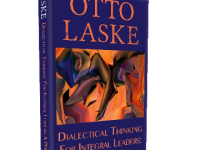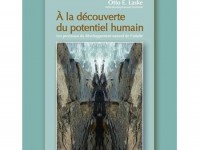In this article, written in response to the 2nd ITC conference (2010), Nick Shannon outlined four main vantage points from which teachings at the Otto Laske Interdevelopmental Institute (IDM) elucidate and strengthen integral thinking: (1) upper left quadrant, (2) dialectical unfolding of concepts, (3) moving from contextual to transformation language, and (4) cognitive development and higher levels of consciousness. Shannon thought that in all of these regards, Otto Laske's teaching clarifies and advances integral thinking. To this day, the promise of this teaching, more recently reinforced by Bhaskar's dialectical writings (1990s), has remained largely unknown or unnoticed. We are reprinting N. Shannon's thoughts here to invite further engagement of integral practitioners with dialectic, a recent topic of Laske's book entitled "Dialectical thinking for integral leaders: A primer" (Integral Publishers, 2015). Shannon, What can IDM offer the Integral Movement Read More...
Category: Dialectical Thinking
Executive Development as Adult Development
This article, chapter 9 of Demick et al’s Handbook of Adult Development (Springer 2002), tries to escape the tunnel vision of organizational theorists and consultants alike who, while glorifying leaders, cannot penetrate to the adult-developmental origins of leadership and get lost in psychological or spiritual speculations, or else lists of competences. Instead, the article adopts the distinction between "ontic" and "agentic" development, that is, the development that happens over human resources' life span development, on one hand, and the organizational mechanisms put in place to "develop" them, on the other. The article conceptualizes executive development as a lawful developmental modification of an individual's professional agenda and universe of discourse in the cognitive and social-emotional sense or, to speak with E. Jaques, his/her Size of Person. Refining Argyris, three levels of professional agenda are distinguished. M. W. McCall Jr.'s (1998) and D. T. Hall's writings (1996) are focused on in order to clarify contemporary theorists' views, referring to McCall's "five dilemmas" of human development in organizations. The article focuses on the dialectic of managerial strengths and weaknesses, the organizational shift to the "Proteian" (internal) career, and introduces Kegan's and Basseches' work alongside with empirical findings of the author. Laske, Executive Development... Read More...
Foundations of Scholarly Consulting: The Developmental Structure/Process Tool
This article of 2000 deepens Argyris’ notion of theory-in-use by recourse to empirical findings of the developmental sciences. It defines "consulting" based on this deeper notion. The article teaches a lesson still not learned in consulting: that theory-in-use has to do with levels of mental growth, both cognitively and social-emotionally, cutting through all "competence models". Consulting is redefined as the interactive design of interventions that take the level of mental growth of organization members and of their culture into account, equally in start-ups. Theory-in-use itself [what people actually do in organizations] is seen as comprising both a structural [social-emotional] aspect, referred to as individuals’ level of evolving self, and a procedural [cognitive] aspect, represented by individuals’ level of complexity handling. Their integration and unity demystifies "consciousness" as well as "leadership". In the process, the Developmental Structure/Process Tool (DSPT) – since 2005 referred to as CDF, Constructive Developmental Framework -- is introduced as an instrument of evidence-based consulting and coaching. CPJ #2, 2000. Read More...
An Integrated Model of Developmental Coaching
This article, originally published in 1999 but still very timely today, introduces a way of deepening cognitive-behavioral, psycho-dynamic, and other behavioral approaches to coaching and HR resources management. It proposes an epistemological model that focuses on adults' frame of reference (world view), the true determinant of human behavior, which has been practiced and taught internationally at the Interdevelopmental Institute (IDM) since 2000. The approach focuses on adults speech behavior as a dimension revealing their developmental profile both social-emotionally (with regard to meaning making) and cognitively (with regard to sense making or *thinking*). The paradigm and the model are developmental in a twofold sense, that of “ontic” development occurring in human organisms as the mature over their lifetime (“nature”), and of “agentic” development brought about by humans (“nurture”). An introduction to the model is presented, followed by the topology of the mental space of coaching, a summary, and suggested topics for future research. Source: Consulting Psychology Journal 51.3, pp. 139-159 CPJ #1, 1999 Read More...
The Constructive Developmental Framework (CDF) as a Talent Finder and Work Design Methodology
In this short article, I highlight the resources of the Constructive Developmental Framework for finding organizational talent and designing a work environment that supports its further growth. CDF as a Talent Finder and Work Design Methodology Read More...
Human Systems in the Anthropocene
This article is a reflection on the lack of systemic and holistic "dialectical" thinking in a world in which more than ever human actions have strong and immediate repercussions in the natural, and thus also the social, environment. It is suggested that present notions of teaching, coaching, and consulting are hopelessly anachronistic since they are built on theories and algorithms of a purely formal logical nature that hinder individuals' potential for dialectical thinking to emerge. Human Systems in the Anthropocene Read More...

